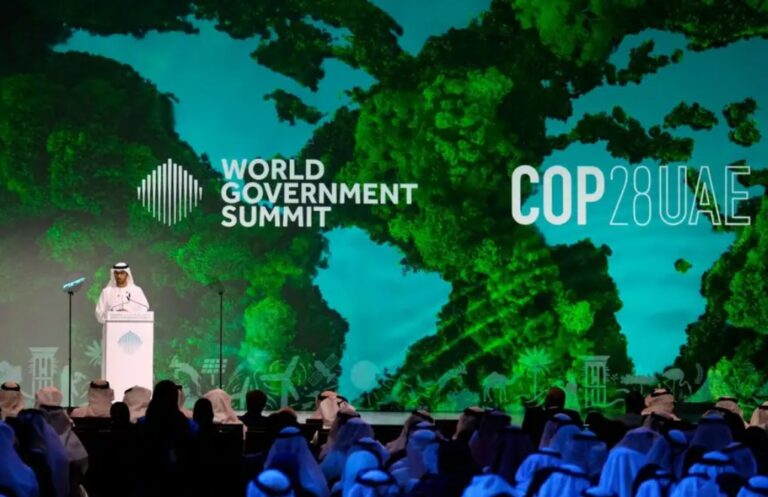Nov. 30 to Dec. 12, 2023, the Cop28, the 28th International Climate Crisis Summit organized by the UN Framework Convention on Climate Change (UNFCCC) takes place in Dubai.
What will delegates from nearly 200 countries, hosted for the occasion in the United Arab Emirates (UAE), talk about? What are the most important decisions we can expect from the summit?
Table of Contents
A particular Cop
Let’s start by saying that this year’s climate summit is of special importance for many reasons. Some are technical: by 2023 the first Global Stocktake (GST) is to be held, that moment when we take stock of progress toward the goals set in 2015 in the Paris Agreement. In the section on the GST we explain how it works and why it is important.
Other reasons are very concrete. Finally, after a 3-year delay, rich countries are expected to put on the table the $100 billion a year in climate finance they pledged back in 2009. Meanwhile, the resources needed to address the climate crisis have become the topic of the negotiating process. And we are no longer just talking about 100 billion.
But there are also (new) political factors to take into account. Above all, the rivalry between the United States and China: it is growing stronger on some issues, while climate has so far been the only area where Beijing and Washington have really sought fruitful cooperation.
It is not a foregone conclusion that in Dubai the understanding between the world’s two leading economies will continue and bear fruit.
Fossil presidents for Cop28 in Dubai
About the ability of Cop28 in Dubai to achieve trasformative results has been in serious doubt since last January. When the UAE released the name of the chair of the negotiating process. It’s a delicate role because the ability to find compromises on the steepest issues during the two-week climate summit depends on the quality of the chair.
Not to mention the drafting of subsequent drafts of final communiqués, in which it is the chair who has the right to propose a synthesis of the demands that have emerged from the countries.
Who is the president of Cop28? His name is Sultan al-Jaber, and for the Emirates he has served both as a special climate envoy, attending many Cops before the one at the end of the year, and, most importantly, he is still the No. 1 of ADNOC, the UAE’s national oil company. Basically, the head of one of the largest fossil companies.
Phase out of fossil (emissions)?
The al-Jaber effect was not long in coming. Just on the issue of fossil phase out, a real red line for Big Oil. Already at Cop27 in Sharm el-Sheikh last year, a majority of countries (between 80 and 100) in favor of including fossil phase out in the negotiations had emerged.
Since 1995, at most, a phase down (reduction, not elimination) of coal alone has been mentioned. This happened at Cop26 in Glasgow. Unfortunately, the Egyptian presidency last year pretended not to have received this request and left phase out out of the final communiqué.
The 1st Global Stocktake (GST)
The first Global Stocktake, the “global stocktake” of progress toward the Paris targets established by Article 14 of the Paris Agreement every 5 years, will be held in this climate. What does it consist of?
Put simply, it involves calculating the impact of all climate measures taken by UNFCCC member countries and seeing if they are enough to meet the Paris Agreement. If not, the GST is the basis for defining how much and how the climate ambition should change.
This is a difficult and delicate task at the same time. Difficult because the GST must take into account all the areas covered by the Paris Agreement. Delicate because the possible revitalization of climate action largely depends on its outcome.
Cop28 in Dubai, the crux of climate finance
Climate finance in just a few years has become the topic of the Cops. The one in Dubai will be no exception. What are we talking about when we refer to climate finance?
This term brings together in one container all the instruments by which countries allocate resources to finance the response to the climate crisis. From mitigation measures to adaptation measures. The main issue is not just how many resources are allocated, but by whom and according to what criteria. In short, it’s all politics.
Read also: The 5 reasons to phase out the fossil fuels era and embrace a greener energy future












